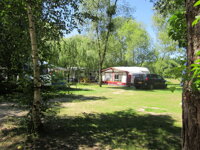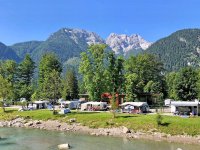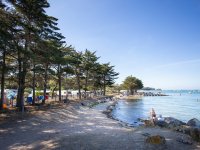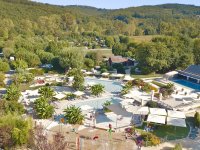
Eco-initiatives and sustainable tourism
Campsite Eco-Initiatives and Camping as a Sustainable Tourist
Eco-Initiatives

An increasing number of environmentally aware campsite owners have introduced various eco-initiatives: installation of solar panels, house-waste sorting, water saving and more. Camping International du Lac (FR70020) has for more than 20 years produced hot water thanks to solar panels, as has Camping 't Veerse Meer (NL6920) and Topcamp Feddet (DK2255).
Environmental awareness is no different from the traditional way of living. Many campsites now cultivate their own kitchen garden or use local produce in their restaurants. Others aim to preserve and educate: Camping La Serre in the Pyrenees offers guided tours of the grounds, discovering the local fauna and flora of the neighbouring nature reserve. La Fôret (FR85360) is committed to caring for its environment with special attention to the on-site vegetation (at least 50 different species of plants).
Some campsites manage to combine both technical eco-initiatives with more intangible environmental measures. Huttopia is one of the most active campsite groups in France, blending in with nature and offering a range of rental accommodations from Canadian-style cabins to fully equipped frontier tents. Campsites are located in forest settings, such as Huttopia Rambouillet (FR78040), or like Huttopia Rillé (FR37140), near the chateaux of the Loire Valley. Amenities are excellent, but the natural unspoilt ambience is rigorously protected. The swimming pools are 100% ecological, with a natural ecosystem as a filter and no use of chemical products.
The Alan Rogers Sustainability & Environment Award
In 2019 we introduced a new category to our Alan Rogers Campsite Awards - The Sustainability & Environment Award.
Our Environmental Award acknowledges campsites which are emphasising care of the environment, possibly with features which are unique and cannot be found elsewhere. We have identified ecological innovation both in campsite amenities and also in rentable accommodation.
Recent winners and runners-up include:
Camping As Sustainable Tourism
Holidaying on a campsite is relatively environmentally sound and ‘low impact’. Camping and caravanning have always been a ‘green’ holiday choice: compatible with the environment, supportive of local suppliers, services and produce and based around non-permanent structures.
Generally speaking, camping, in all its forms, involves staying on a patch of grass or in a mobile home-style construction which has no foundations and whose removal would immediately return the area to its natural state. Most of our time camping is spent outdoors: on a campsite, we wake up to birdsong and the rustle of leaves rather than the air-conditioned bubble of a bland hotel. And when travelling to our campsite, we use the existing infrastructure of roads, cities, towns, villages and farms rather than the concrete deserts of purpose-built holiday resorts.
Some time ago, when a campsite installed a bottle bank, it made a serious environmental statement. Those days are long gone. Campers and caravanners are more informed, new regulations have been introduced, and higher standards and requirements have been imposed. In short, there are higher expectations all around.



